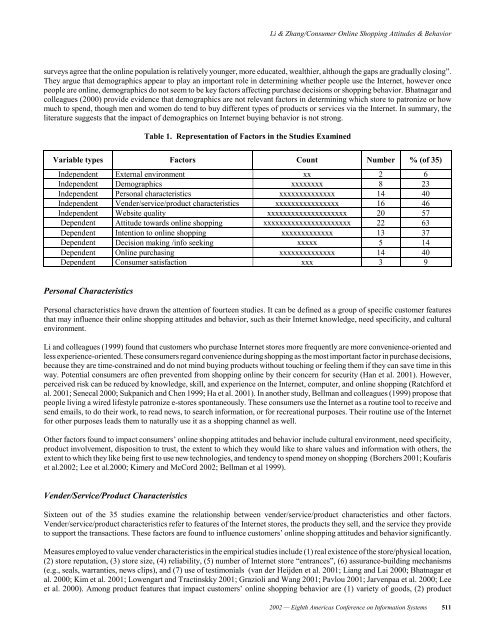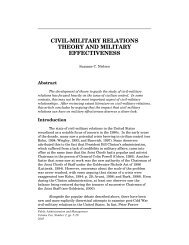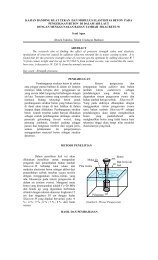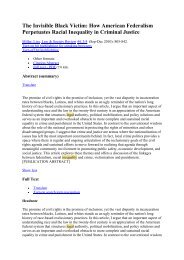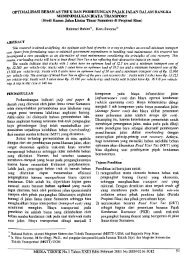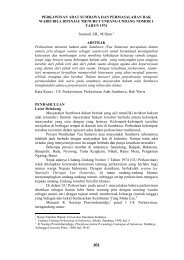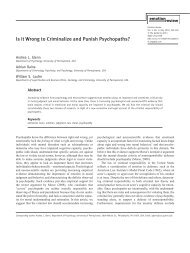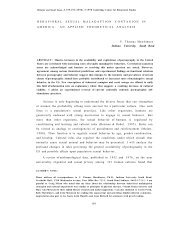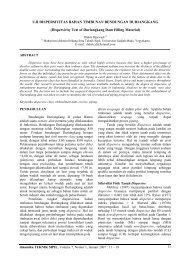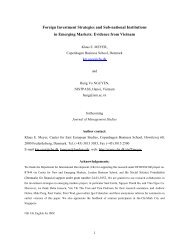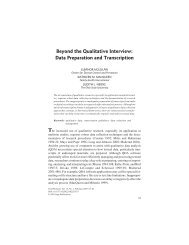Consumer Online Shopping Attitudes and Behavior: An ... - E-Journal
Consumer Online Shopping Attitudes and Behavior: An ... - E-Journal
Consumer Online Shopping Attitudes and Behavior: An ... - E-Journal
Create successful ePaper yourself
Turn your PDF publications into a flip-book with our unique Google optimized e-Paper software.
Li & Zhang/<strong>Consumer</strong> <strong>Online</strong> <strong>Shopping</strong> <strong>Attitudes</strong> & <strong>Behavior</strong><br />
surveys agree that the online population is relatively younger, more educated, wealthier, although the gaps are gradually closing”.<br />
They argue that demographics appear to play an important role in determining whether people use the Internet, however once<br />
people are online, demographics do not seem to be key factors affecting purchase decisions or shopping behavior. Bhatnagar <strong>and</strong><br />
colleagues (2000) provide evidence that demographics are not relevant factors in determining which store to patronize or how<br />
much to spend, though men <strong>and</strong> women do tend to buy different types of products or services via the Internet. In summary, the<br />
literature suggests that the impact of demographics on Internet buying behavior is not strong.<br />
Table 1. Representation of Factors in the Studies Examined<br />
Variable types Factors Count Number % (of 35)<br />
Independent External environment xx 2 6<br />
Independent Demographics xxxxxxxx 8 23<br />
Independent Personal characteristics xxxxxxxxxxxxxx 14 40<br />
Independent Vender/service/product characteristics xxxxxxxxxxxxxxxx 16 46<br />
Independent Website quality xxxxxxxxxxxxxxxxxxxx 20 57<br />
Dependent Attitude towards online shopping xxxxxxxxxxxxxxxxxxxxxx 22 63<br />
Dependent Intention to online shopping xxxxxxxxxxxxx 13 37<br />
Dependent Decision making /info seeking xxxxx 5 14<br />
Dependent <strong>Online</strong> purchasing xxxxxxxxxxxxxx 14 40<br />
Dependent <strong>Consumer</strong> satisfaction xxx 3 9<br />
Personal Characteristics<br />
Personal characteristics have drawn the attention of fourteen studies. It can be defined as a group of specific customer features<br />
that may influence their online shopping attitudes <strong>and</strong> behavior, such as their Internet knowledge, need specificity, <strong>and</strong> cultural<br />
environment.<br />
Li <strong>and</strong> colleagues (1999) found that customers who purchase Internet stores more frequently are more convenience-oriented <strong>and</strong><br />
less experience-oriented. These consumers regard convenience during shopping as the most important factor in purchase decisions,<br />
because they are time-constrained <strong>and</strong> do not mind buying products without touching or feeling them if they can save time in this<br />
way. Potential consumers are often prevented from shopping online by their concern for security (Han et al. 2001). However,<br />
perceived risk can be reduced by knowledge, skill, <strong>and</strong> experience on the Internet, computer, <strong>and</strong> online shopping (Ratchford et<br />
al. 2001; Senecal 2000; Sukpanich <strong>and</strong> Chen 1999; Ha et al. 2001). In another study, Bellman <strong>and</strong> colleagues (1999) propose that<br />
people living a wired lifestyle patronize e-stores spontaneously. These consumers use the Internet as a routine tool to receive <strong>and</strong><br />
send emails, to do their work, to read news, to search information, or for recreational purposes. Their routine use of the Internet<br />
for other purposes leads them to naturally use it as a shopping channel as well.<br />
Other factors found to impact consumers’ online shopping attitudes <strong>and</strong> behavior include cultural environment, need specificity,<br />
product involvement, disposition to trust, the extent to which they would like to share values <strong>and</strong> information with others, the<br />
extent to which they like being first to use new technologies, <strong>and</strong> tendency to spend money on shopping (Borchers 2001; Koufaris<br />
et al.2002; Lee et al.2000; Kimery <strong>and</strong> McCord 2002; Bellman et al 1999).<br />
Vender/Service/Product Characteristics<br />
Sixteen out of the 35 studies examine the relationship between vender/service/product characteristics <strong>and</strong> other factors.<br />
Vender/service/product characteristics refer to features of the Internet stores, the products they sell, <strong>and</strong> the service they provide<br />
to support the transactions. These factors are found to influence customers’ online shopping attitudes <strong>and</strong> behavior significantly.<br />
Measures employed to value vender characteristics in the empirical studies include (1) real existence of the store/physical location,<br />
(2) store reputation, (3) store size, (4) reliability, (5) number of Internet store “entrances”, (6) assurance-building mechanisms<br />
(e.g., seals, warranties, news clips), <strong>and</strong> (7) use of testimonials (van der Heijden et al. 2001; Liang <strong>and</strong> Lai 2000; Bhatnagar et<br />
al. 2000; Kim et al. 2001; Lowengart <strong>and</strong> Tractinskky 2001; Grazioli <strong>and</strong> Wang 2001; Pavlou 2001; Jarvenpaa et al. 2000; Lee<br />
et al. 2000). Among product features that impact customers’ online shopping behavior are (1) variety of goods, (2) product<br />
2002 — Eighth Americas Conference on Information Systems 511


